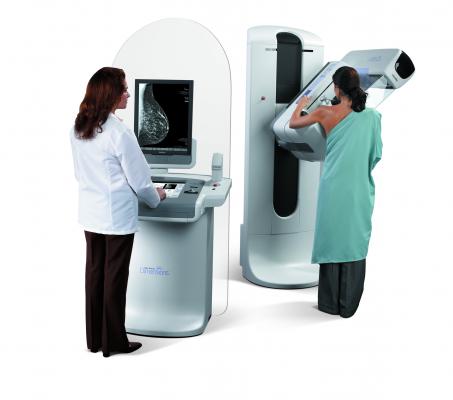
September 21, 2012—GE Healthcare, a business division of General Electric Company, announced it is joining with RadNet, a network of outpatient diagnostic imaging centers, to pilot its Best Pathways initiative, a breast cancer detection optimization model. GE Healthcare and RadNet will evaluate the clinical breast cancer detection process to quantify inefficient diagnostic patterns and identify optimal paths to lower cost and improve patient outcomes. This program will focus on subpopulations of women in which guidelines are lacking and substantial variability is observed in clinical practice.
Best Pathways is designed to address a significant need for increased insight into the breast cancer detection process--from a patient’s initial screening mammogram to final biopsy. Historically, diagnostic processes have been variable and inefficient, leading to frequent false-positive test results and costly follow-up imaging procedures. In 2009, the U.S. Preventative Services Task Force (USPSTF) tightened recommendations for breast cancer screenings across multiple patient populations, citing lack of evidence supporting benefits and high cost of the screenings as primary factors.
“This initiative will provide deeper understanding of care patterns and ways to optimize processes to ensure the best outcomes for patients and operational efficiency for providers,” said Dr. Howard Berger, president and chief executive officer (CEO), RadNet. “With the technological and process expertise that GE Healthcare offers, as well as our shared passion for improving access to low-cost healthcare solutions, we look forward to improving care protocols in the detection of breast cancer.”
GE Healthcare and RadNet will identify and quantify diagnostic costs per cancer detected, the types of breast cancer detected and their stage distribution, the number of imaging tests and biopsies required to detect each cancer and the incremental cost-effectiveness ratios for each diagnostic case. Diagnostic patterns will be identified based on patient population characteristics including age, risk of developing breast cancer and breast density. The program will also seek to define optimal diagnostic paths for patient care based on rigorous data and analysis.
“Improving efficiency and outcomes in breast cancer detection supports our healthymagination commitment to delivering high-quality healthcare at a lower cost,” said David Lee, head of Health Economics and Reimbursement for GE Healthcare in the US and Canada. “We are pleased to work with RadNet to pilot our breast cancer detection optimization model in the clinical setting and look forward to identifying opportunities to improve the diagnosis and treatment of breast cancer while increasing efficiency and cost savings.”
GE Healthcare’s Best Pathways initiative was developed in collaboration with academic and community mammographers, primary care physicians and breast surgeons to explore alternative detection strategies and understand the need for new diagnostic technologies. Through its participation and eventual findings to be released publicly, RadNet will be able to refine and customize its breast cancer detection processes for its imaging centers for improved efficiency and better patient care.
For more information: www.radnet.com


 February 18, 2026
February 18, 2026 









